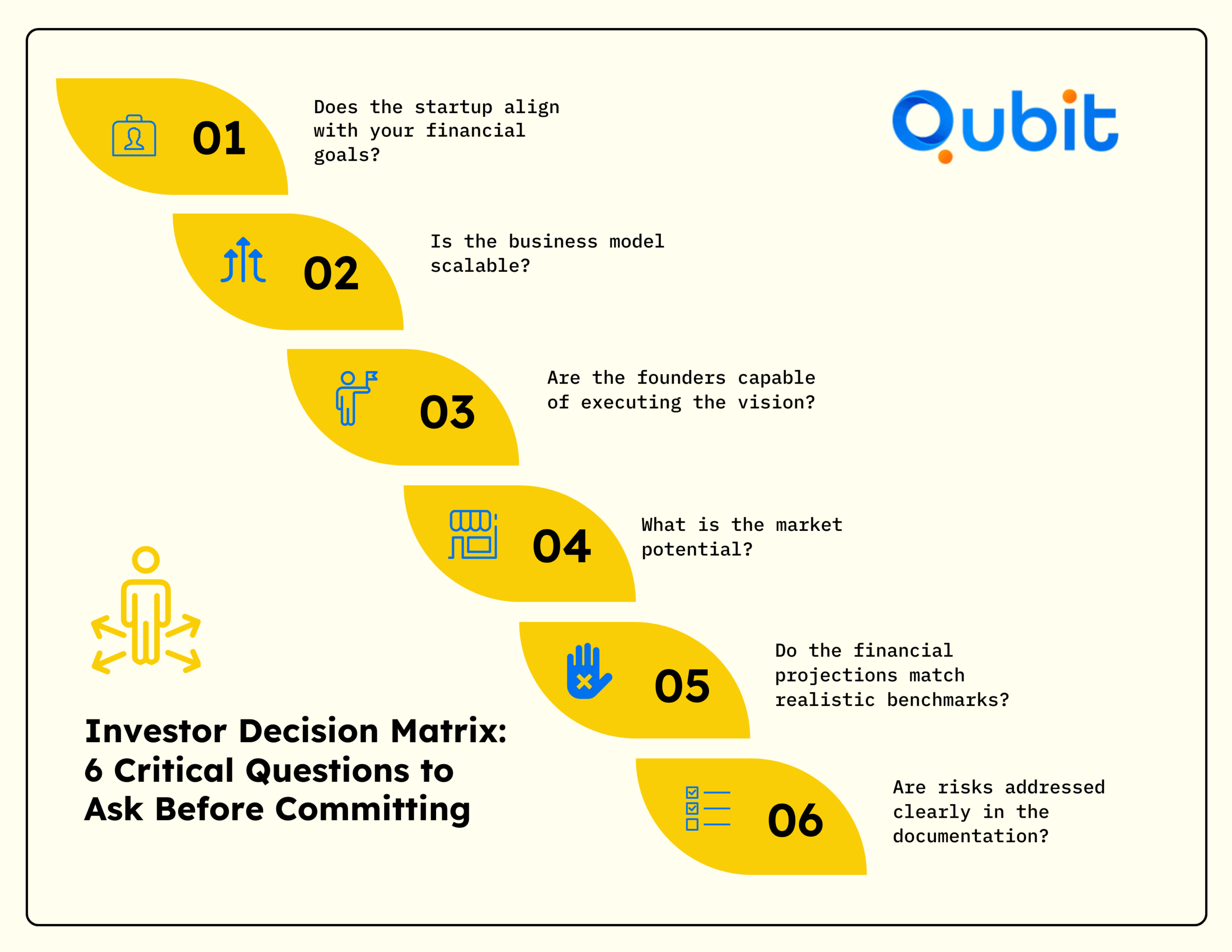Launching a startup company investing journey requires more than just a groundbreaking idea—it demands a well-thought-out investment strategy. Whether you're seeking funding or planning how to invest in a startup, understanding the dynamics of startup investment plans is essential. Investors are drawn to businesses that demonstrate both innovation and a clear roadmap for growth.
Gaining insight into the understanding investor mindset can provide startups with a competitive edge when pitching their ideas. By aligning your strategy with investor expectations, you can position your startup as a lucrative opportunity.
This blog will guide you through actionable strategies to craft a winning investment plan, ensuring your startup stands out in the competitive landscape. Let’s jump right in!
Kickoff Considerations for a Winning Investment Strategy
Establishing a successful investment strategy begins with a thoughtful evaluation process that benefits both the startup and the investor. For startups, this stage is critical to aligning with investors who bring more than just financial resources to the table. For investors, it’s an opportunity to assess the potential of a startup beyond its immediate market value.
The concept of "smart capital" plays a pivotal role here. Early-stage investment decisions should prioritize not just monetary contributions but also the strategic guidance and industry expertise that investors can provide. This dual focus ensures that startups receive the support they need to scale effectively while investors build a portfolio with long-term growth potential.
Every successful startup begins with a solid foundation, and understanding startup fundraising strategies is a critical first step. This approach ensures that both parties are well-prepared for a mutually beneficial partnership, setting the stage for sustainable success.
Objectives and Strategy for Optimal Investment
Establishing clear organizational goals is the cornerstone of any successful startup company investing strategy. These goals serve as a guiding framework, ensuring that operational priorities align seamlessly with investment decisions. When startups integrate their operational objectives with investment strategies, they create a cohesive roadmap that maximizes efficiency and growth potential.
A well-defined startup investment plan should focus on aligning funding efforts with the company’s mission and long-term vision. This approach ensures that every investment decision supports operational milestones, from product development to market expansion. For startups aiming to attract investors, mastering how to win startup pitch competitions is essential for building credibility and securing funding.
By prioritizing alignment between organizational goals and investment strategies, startups can position themselves for sustainable success. This synergy not only drives growth but also fosters investor confidence, making it easier to secure the resources needed for scaling.
Crafting an Impactful Pitch for Investors
A compelling pitch is the cornerstone of successful investor engagement. For a startup company investing in its growth, presenting a well-structured pitch can make all the difference. Investors are drawn to clarity, organization, and realistic projections, so formalizing your pitch process is essential. This means crafting a narrative that highlights your startup’s unique value, market potential, and growth strategy while steering clear of common mistakes.
Premature commitments, such as requesting early NDAs or making exaggerated claims about market dominance, can raise red flags for investors. These pitfalls often signal a lack of preparation or overconfidence, both of which can undermine trust. Instead, focus on presenting data-driven insights and achievable milestones that demonstrate your startup’s potential.
A well-executed PR campaign can amplify your startup's visibility, making it easier to attract the right investors. For example, using media and PR for fundraising can enhance your pitch presentation by showcasing your startup’s credibility and market presence.
By avoiding alarm signals and presenting a polished, professional pitch, you set the stage for meaningful investor conversations. Remember, your pitch is not just about securing funding—it’s about building long-term partnerships that drive your startup’s success.
Essential Information Exchange for Investment Transparency
Transparent communication between startups and investors begins with thorough documentation. It's one of the most advanced fundraising strategies out there. Sharing detailed records, such as financial statements, business plans, and operational data, establishes a foundation of trust. This exchange ensures that both parties have a clear understanding of expectations, risks, and potential rewards.
For investors, access to comprehensive data builds confidence in the startup's ability to deliver on its promises. It also enables them to make informed decisions about funding options for startup ventures. On the other hand, startups benefit by demonstrating their commitment to accountability, which can attract long-term partnerships.
When considering startup company investing, transparency isn’t just an ethical practice—it’s a strategic advantage. By prioritizing clear and open information sharing, startups can foster stronger relationships with investors, paving the way for sustainable growth.
Assessing Venture Maturity
Understanding the maturity of a startup is essential for crafting effective investment strategies and validation processes. Each stage of a venture’s development presents unique challenges and opportunities, requiring tailored approaches to maximize potential.
Evaluating maturity levels allows investors to align their startup company investing strategies with the specific needs of the business. Early-stage startups may demand a focus on product validation and market fit, while more mature ventures often require scaling solutions and operational efficiency.
Investment evaluation tracks should adapt to the venture's growth stage. For instance, startups in their infancy benefit from metrics like customer acquisition rates and prototype success, whereas established companies might prioritize revenue growth and market expansion.
Measuring Impact vs. Activity: Beyond Earnings
Focusing solely on earnings can obscure the bigger picture for a startup company investing in long-term success. By tracking both impact and activity, businesses can ensure their operational practices align with their strategic goals. This dual approach fosters sustainable growth and investor confidence.
Metrics that highlight impact go beyond traditional performance indicators, offering insights into how well a company is positioned for future opportunities. For instance, understanding market interest through community engagement—such as the 40k+ innovators who subscribe to updates—can validate a startup's relevance and readiness. This data can serve as a practical measure of alignment between operational efforts and investment strategies.
Learning before earning is a critical mindset for startups aiming to build resilience. By adopting metrics that reflect both operational performance and investor readiness, companies can create a balanced startup investment plan that prioritizes sustainability over short-term gains.
Validating Your Venture: Minimizing Investment Risks
Early-stage validation is the cornerstone of reducing risks in startup company investing. Before committing substantial resources, entrepreneurs must ensure their venture has a solid foundation. A thorough validation process not only evaluates the feasibility of the business idea but also identifies potential uncertainties that could hinder growth.
Extensive validation involves analyzing market demand, assessing competitors, and testing the product or service with real users. This approach helps uncover critical insights that refine the business model and improve the likelihood of success. For investors wondering how to invest in a startup, asking the right questions during this phase is essential to gauge the venture's potential.
By prioritizing validation, startups can minimize investment risks and build confidence in their scalability. A robust process ensures that both founders and investors are equipped with the data needed to make informed decisions, paving the way for sustainable growth.
Understanding Venture Valuation Dynamics
Startup valuation is a multifaceted process that demands both precision and expertise. Determining a company's worth involves analyzing market trends, financial projections, and growth potential, but it also hinges on the insights of seasoned professionals. Their expertise ensures that valuations align with realistic funding goals, avoiding overestimations that can deter investors or underestimations that undervalue the startup's potential.
Equally important is the role of relationship-building during valuation discussions. Strong connections foster trust and transparency, creating a collaborative environment where both founders and investors can align their expectations. For instance, understanding real-world funding benchmarks, such as the average seed round of $2.2 million reported by TechCrunch, can help startups set achievable targets. Incorporating this average into financial forecasts ensures that funding goals remain grounded in industry realities.
Exploring international fundraising strategies can further enhance valuation discussions, opening doors to global investment opportunities. By combining expert insights with strategic relationship-building, startups can position themselves for sustainable growth while attracting the right investors.
Setting Investment Criteria and Final Decision

Establishing clear investment criteria is the cornerstone of evaluating potential opportunities. A well-defined checklist ensures that every critical aspect of startup company investing is addressed systematically. Begin by asking essential questions: Does the startup align with your financial goals? Is the business model scalable? Are the founders experienced and capable of executing their vision? These questions to ask before investing in a startup help filter viable options from risky ventures.
Once the evaluation is complete, summarize and validate all findings to ensure no detail is overlooked. This step is crucial for making informed decisions. Compile insights on market potential, financial projections, and risk factors into a concise report.
Before committing, revisit your checklist to confirm alignment with your investment strategy. This structured approach not only minimizes uncertainty but also builds confidence in the final decision. Investing in startups requires diligence, and a systematic process ensures your decision is both calculated and strategic.
Using Strategic Partnerships for Investment Growth
Building strong relationships is essential for a winning investment strategy. Strategic partnerships enable startups to access new markets, gain expert insights, and secure additional funding opportunities. These collaborations create a synergy where each partner contributes unique strengths, driving accelerated growth and increasing investor confidence.
Consider these approaches when cultivating strategic partnerships:
- Industry Collaborations: Work with established companies to share resources, technology, and market insights.
- Academic Alliances: Engage with research institutions to tap into cutting-edge innovations and emerging trends.
- Networking Events: Attend conferences, seminars, and pitch competitions to connect with potential investors and partners.
Effective partnerships require clear communication, shared goals, and mutual trust. Startups should invest time in nurturing these relationships through regular check-ins, transparent reporting, and joint initiatives. This proactive approach not only enhances operational capabilities but also builds credibility with investors.
Moreover, strategic partnerships can unlock co-investment opportunities and valuable mentorship programs. These alliances offer financial support while refining your business model and broadening market reach.
Conclusion
Crafting a robust investment strategy is the cornerstone of startup success. Throughout this blog, we’ve explored essential strategies, from creating compelling pitches to executing seamless exits. Each step plays a vital role in building investor confidence and ensuring the sustainability of your business.
A well-thought-out approach not only attracts the right capital but also sets the stage for long-term growth. Whether you're refining your pitch or planning exit strategies for startups, expert guidance can make all the difference.
If you're ready to elevate your startup investment strategy and secure the right capital, we at Qubit Capital are here to help. Check out our Fundraising Assistance service today. Let’s work together to turn your vision into reality.
Key Takeaways
- A clear, data-driven roadmap is essential for startup investment success.
- Aligning funding strategies with operational goals ensures better outcomes.
- Effective pitch preparation and risk assessment are critical components.
- Utilizing diverse funding sources and thorough due diligence minimizes risk.
- Actionable checklists and expert resources empower both startups and investors.
Frequently asked Questions
Which is the best strategy for a beginning investment?
Starting small with a diversified portfolio is a prudent approach for beginners. Conduct thorough due diligence to understand the market and potential risks. Following a step-by-step evaluation process can help identify the most promising opportunities.


 Back
Back



